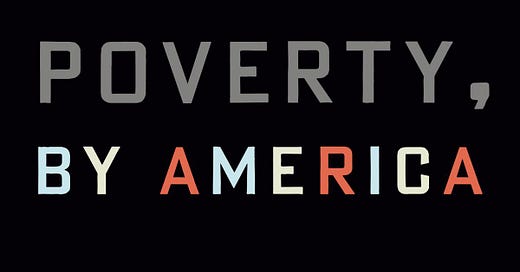In his new book “Poverty, by America”, Matthew Desmond addresses the persistence of poverty in the United States despite the country’s wealth. It is related to his previous book “Evicted” in that both books look at poverty in America; however, while Evicted focuses specifically on housing instability and its impact on poverty, Poverty, by America takes a more systemic view of poverty, examining it as a complex issue caused by a range of societal problems, including economic, social, and political factors.
Desmond’s definition of poverty is breaking with the conventional ones that emphasise on low incomes and show poverty as the result of deindustrialization and family dissolution. Instead, he argues that poverty is mainly the product of choices and actions by more fortunate Americans, who knowingly and unknowingly contribute to its persistence. He maintains that the better-off are fighting a class war, keeping the poor down by design, while government’s social policy acts in ways that perpetuate poverty in America.
The biggest government subsidies are not directed at families trying to climb out of poverty but instead go to ensure that well- o families stay well- o. This leaves fewer resources for the poor. If this is our design, our social contract, then we should at least own up to it. We should at least stand up and profess, Yes, this is the kind of nation we want.
Desmond uses a range of evidence to support his argument about the causes of poverty in America, including government policy, specific practices and policies, and societal attitudes towards poverty, such as excessive regulations on housing construction, segregated public schools, and lack of connection between people of different classes. “Poverty”, he says, “isn’t simply the condition of not having enough money. It’s the condition of not having enough choice and being taken advantage of because of that, and he challenges social service organizations to focus on empowering the poor and expanding their choices, rather than simply providing them with financial assistance.
Countries that make the deepest investments in their people, particularly through universal programs that benefit all citizens, have the lowest rates of poverty, including among households headed by single mothers. In many European countries and Canada, for example, a wide range of social insurance programs help to keep families out of poverty. These include children’s allowances, unemployment assistance and universal health coverage, along with considerable support for child care. In the United States, childcare is increasingly privatised, making it impossible for many single parents or mothers to go back to work full time. The same could be said for the United Kingdom; childcare costs can take up a large chunk of a family’s income, making it unaffordable for many parents.
Equal opportunity is possible only if everyone can access childcare centers, good schools, and safe neighborhoods— all of which serve as engines of social mobility. But private opulence and public squalor leads to “the commodication of opportunity,” where those engines of social mobility now cost something. The best way to ensure that opportunity is unequal and unfair is to charge for it.
Matthew Desmond challenges social service organizations to think more broadly about the issue of poverty and to embrace new approaches to addressing it, through empowering the poor, more unionization, and new rules to make housing more affordable and lending less predatory. He calls for an “abolitionist” crusade against poverty, which would “oppose racism, segregation, and opportunity hoarding in our communities, and stand for shared prosperity.”
If we had to boil it down to a single concept, we might just say that without poverty, we’d be more free. A nation invested in ending poverty is a nation that is truly, obsessively committed to freedom. Franklin Roosevelt was right: ‘True individual freedom cannot exist without economic security and independence. Necessitous men are not free men,’ and a country besieged by poverty is not a free country.
The major reason poverty persists is that the fortunate do not realise they are privileged, and when they do, they refuse to give up part of their privileges, paying more taxes, for example. Sharing opportunities previously hoarded doesn’t mean everyone wins, says Matthew Desmond. It means that those who have benefited from a country’s excesses will have to take less so that others may share the wealth.




